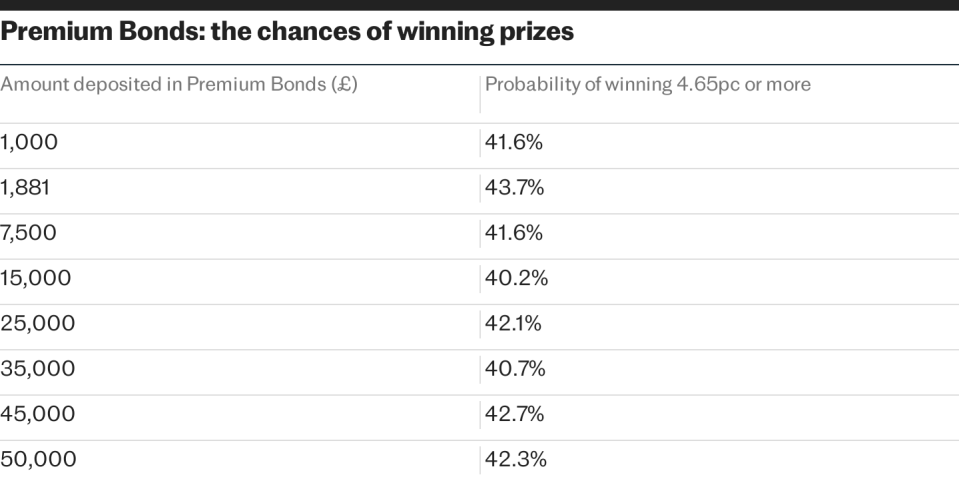‘My job is to tell people they’ve won £1m – but not everyone is pleased to see me’

Many of us have sat with a coffee at a service station during a long drive, pretending that we’re a secret agent on a world-saving mission.
But while for most this is purely the stuff of fantasy, for an Agent Million, this happens almost every month.
There are five Agent Millions located across the UK – undercover operatives headhunted by National Savings & Investments (NS&I) to tell Premium Bond holders they’ve won the £1m jackpot each month.
“I often sit there and look at the people around me and I think: ‘No one has any idea who I am.’ It’s really exciting,” Agent Million explains.
This secret agent is a woman, but that’s the only clue offered about her identity during the interview. The role is even concealed from friends and family for fear of identifying a winner and placing them at risk because of their newfound wealth.
The only people who get to know who the Agent Million are their manager and the customers who win, as they are invited to check their ID.
She’s been doing the job for four and a half years, and has paid out more than £20m in prizes to unsuspecting winners who have no idea they have won until she turns up on their doorstep.
The first Premium Bonds prize draw was held in June 1957, when one NS&I saver won the top prize of £1,000. Today, Ernie, the machine that generates the winning numbers, selects two £1m winners each month.
To date, it has paid out more than 654 million prizes worth a total of nearly £30bn.

Agent Million explains she had wanted to do the job for years before she was headhunted for it, explaining: “I didn’t realise they’d been watching me for quite a while before that.”
She says the role is highly sought-after at NS&I, coming as it does with the adrenaline and excitement of telling winners their lives have changed overnight.
The agent has to prepare carefully for each trip, planning her travel and accommodation, as well as plotting routes to the winners’ homes and coming up with back-up plans.
There are strict rules about what the secret prize givers are allowed to wear when they go undercover, so that they remain incognito. She says: “I want to look presentable. But I don’t want to look like a salesperson.
“Similarly, I don’t want to look like I am bringing someone £1m either. I just make myself presentable and approachable.”
The elusive worker explains she gets very nervous, and usually can’t stomach anything on the day.
She says: “Invariably I can’t eat before I go to someone’s house. If I’ve got a long way to go, I’ll have some breakfast in the morning, but until I’ve done what I’ve gone to do, I can’t eat.
“When I am about 10 minutes away from where I am going, the tummy goes. It’s all butterflies. It’s always unique, every single visit is unique.”
She often has to drive to remote locations, she explains, recalling one memorable trip to the Scottish Highlands.
“I went to find this house, but it didn’t have a house number, it had a name. It was in a remote part of the Highlands, and none of the houses had numbers, it was all names,” she says.
“Then my phone dropped. I ended up having to go into a local business and asked if I could use their landline to call my manager.”
After driving around in circles for hours, she finally found the house she’d been looking for.
She jokes: “Later on, when we sorted everything out, the winner said: ‘Oh, I don’t know what we’re going to do with the money.’ And I said: ‘I know what you can do, you can put a house name on your property so we can find you!’”
‘The winner closed the door on me’
It’s not always easy to get inside. On one occasion, she says, a gentleman refused to let her in to speak to his wife.
“One time I knocked on a door on a Sunday afternoon. It was a full door with no glass in it but there was a glass panel on the side,” she says.
She explains: “The gentleman answered the door. It was his wife I was going to see, so I asked for her, and he looked me up and down and said, ‘No, no, I’ve seen your kind before,’ and closed the door on me.”
“I am standing there and I’m thinking, ‘Oh’. But I can see him peeking through the glass. He opened the door again. I used a little bit of charm and asked for his wife again.
“It’s all about staying calm, and knowing that you’re there for the right reasons, and knowing what you’re doing is going to change their life,” she says.

The man in question was very apologetic afterwards, she says, once he realised he’d nearly turned away £1m.
Once she knocks on a winner’s door, they can call an NS&I hotline to verify her identity, to prove she’s not a fraudster.
“I know even when it is a bit bumpy, and they’re not sure about letting you in at the beginning, that it’s going to end in tears, hugs and happiness; that it’s going to be a good day,” she says.
“There’s all sorts of reactions. There’s laughing, crying, I’ve seen couples cuddling each other and jumping around. Some people are quieter and it takes a moment to go in. Then they start talking,” she describes.
One man didn’t react at all, she says, which unnerved her, but he overcame his shock in time to ask her if he needed to sign anything.
But with millions logging in every month to check their Premium Bond winnings on the NS&I app, justifying the cost of sending out Agent Million is getting harder.
Why not just give the winners a ring, or even update them by email or in the app, which would tell them instantaneously?
Despite the cost of travel, food, hotels and, of course, paying the Agent Millions, the government-backed body thinks it is still worth sending out a real person for one simple reason: the winners love it.
Recommended
Premium Bonds: how do you buy them and what are the chances of winning?

 Yahoo News
Yahoo News 
